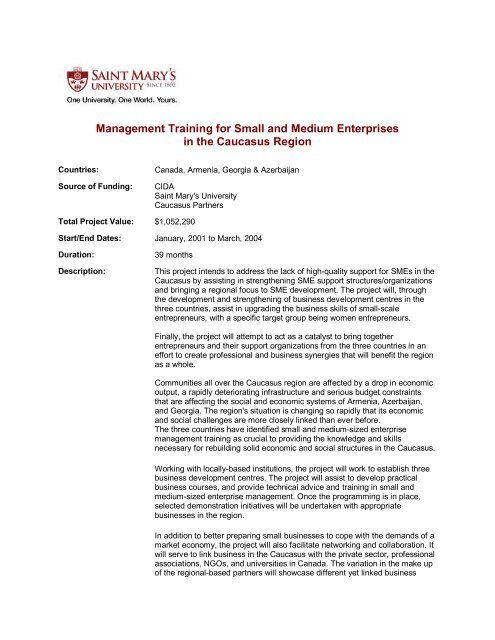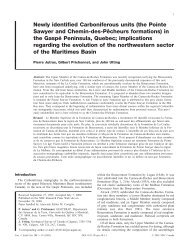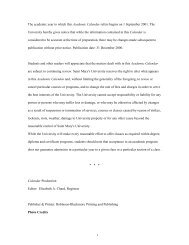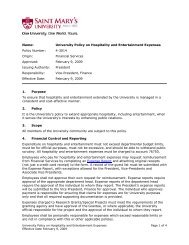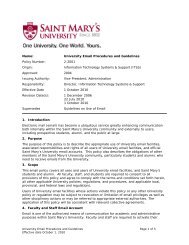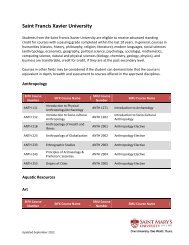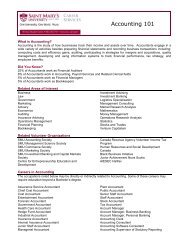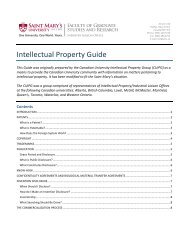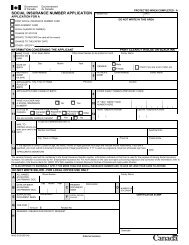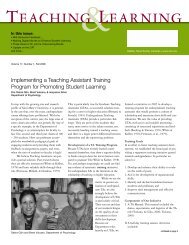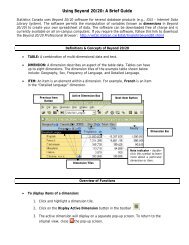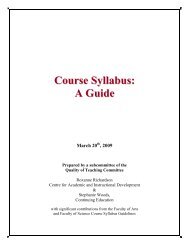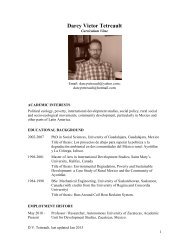Management Training for Small and Medium Enterprises in the ...
Management Training for Small and Medium Enterprises in the ...
Management Training for Small and Medium Enterprises in the ...
Create successful ePaper yourself
Turn your PDF publications into a flip-book with our unique Google optimized e-Paper software.
<strong>Management</strong> <strong>Tra<strong>in</strong><strong>in</strong>g</strong> <strong>for</strong> <strong>Small</strong> <strong>and</strong> <strong>Medium</strong> <strong>Enterprises</strong><br />
<strong>in</strong> <strong>the</strong> Caucasus Region<br />
Countries:<br />
Source of Fund<strong>in</strong>g:<br />
Canada, Armenia, Georgia & Azerbaijan<br />
CIDA<br />
Sa<strong>in</strong>t Mary's University<br />
Caucasus Partners<br />
Total Project Value: $1,052,290<br />
Start/End Dates: January, 2001 to March, 2004<br />
Duration:<br />
Description:<br />
39 months<br />
This project <strong>in</strong>tends to address <strong>the</strong> lack of highquality support <strong>for</strong> SMEs <strong>in</strong> <strong>the</strong><br />
Caucasus by assist<strong>in</strong>g <strong>in</strong> streng<strong>the</strong>n<strong>in</strong>g SME support structures/organizations<br />
<strong>and</strong> br<strong>in</strong>g<strong>in</strong>g a regional focus to SME development. The project will, through<br />
<strong>the</strong> development <strong>and</strong> streng<strong>the</strong>n<strong>in</strong>g of bus<strong>in</strong>ess development centres <strong>in</strong> <strong>the</strong><br />
three countries, assist <strong>in</strong> upgrad<strong>in</strong>g <strong>the</strong> bus<strong>in</strong>ess skills of smallscale<br />
entrepreneurs, with a specific target group be<strong>in</strong>g women entrepreneurs.<br />
F<strong>in</strong>ally, <strong>the</strong> project will attempt to act as a catalyst to br<strong>in</strong>g toge<strong>the</strong>r<br />
entrepreneurs <strong>and</strong> <strong>the</strong>ir support organizations from <strong>the</strong> three countries <strong>in</strong> an<br />
ef<strong>for</strong>t to create professional <strong>and</strong> bus<strong>in</strong>ess synergies that will benefit <strong>the</strong> region<br />
as a whole.<br />
Communities all over <strong>the</strong> Caucasus region are affected by a drop <strong>in</strong> economic<br />
output, a rapidly deteriorat<strong>in</strong>g <strong>in</strong>frastructure <strong>and</strong> serious budget constra<strong>in</strong>ts<br />
that are affect<strong>in</strong>g <strong>the</strong> social <strong>and</strong> economic systems of Armenia, Azerbaijan,<br />
<strong>and</strong> Georgia. The region's situation is chang<strong>in</strong>g so rapidly that its economic<br />
<strong>and</strong> social challenges are more closely l<strong>in</strong>ked than ever be<strong>for</strong>e.<br />
The three countries have identified small <strong>and</strong> mediumsized enterprise<br />
management tra<strong>in</strong><strong>in</strong>g as crucial to provid<strong>in</strong>g <strong>the</strong> knowledge <strong>and</strong> skills<br />
necessary <strong>for</strong> rebuild<strong>in</strong>g solid economic <strong>and</strong> social structures <strong>in</strong> <strong>the</strong> Caucasus.<br />
Work<strong>in</strong>g with locallybased <strong>in</strong>stitutions, <strong>the</strong> project will work to establish three<br />
bus<strong>in</strong>ess development centres. The project will assist to develop practical<br />
bus<strong>in</strong>ess courses, <strong>and</strong> provide technical advice <strong>and</strong> tra<strong>in</strong><strong>in</strong>g <strong>in</strong> small <strong>and</strong><br />
mediumsized enterprise management. Once <strong>the</strong> programm<strong>in</strong>g is <strong>in</strong> place,<br />
selected demonstration <strong>in</strong>itiatives will be undertaken with appropriate<br />
bus<strong>in</strong>esses <strong>in</strong> <strong>the</strong> region.<br />
In addition to better prepar<strong>in</strong>g small bus<strong>in</strong>esses to cope with <strong>the</strong> dem<strong>and</strong>s of a<br />
market economy, <strong>the</strong> project will also facilitate network<strong>in</strong>g <strong>and</strong> collaboration. It<br />
will serve to l<strong>in</strong>k bus<strong>in</strong>ess <strong>in</strong> <strong>the</strong> Caucasus with <strong>the</strong> private sector, professional<br />
associations, NGOs, <strong>and</strong> universities <strong>in</strong> Canada. The variation <strong>in</strong> <strong>the</strong> make up<br />
of <strong>the</strong> regionalbased partners will showcase different yet l<strong>in</strong>ked bus<strong>in</strong>ess
development models. The "best practices" from <strong>the</strong>se models will<br />
subsequently be adapted to meet <strong>the</strong> <strong>in</strong>dividual needs <strong>and</strong> contexts.<br />
The specific problems to be addressed <strong>in</strong> this project are <strong>the</strong> follow<strong>in</strong>g:<br />
1. Entrepreneurs <strong>in</strong> <strong>the</strong> Caucasus generally lack access to highquality<br />
professional support services. Foreign <strong>in</strong>vestment is open<strong>in</strong>g new<br />
opportunities <strong>for</strong> SMEs, but <strong>the</strong>y can realize <strong>the</strong>se opportunities only if<br />
<strong>the</strong>y are able to rapidly ga<strong>in</strong> <strong>and</strong> adopt modern bus<strong>in</strong>ess skills. They<br />
need a wide range of <strong>in</strong><strong>for</strong>mation, advice, <strong>and</strong> tra<strong>in</strong><strong>in</strong>g. SMEs are<br />
significantly affected by <strong>the</strong> scarcity of skilled employees <strong>and</strong> <strong>the</strong><br />
resultant high wages. F<strong>in</strong>ally, entrepreneurs <strong>in</strong> <strong>the</strong> Caucasus have<br />
very little experience <strong>in</strong> market<strong>in</strong>g.<br />
2. No powerful communitybased organizations, nongovernmental<br />
organizations or professional associations with regional ties have yet<br />
emerged to represent <strong>the</strong> <strong>in</strong>terests of SMEs <strong>in</strong> <strong>the</strong> Caucasus. This is<br />
true <strong>in</strong> spite of <strong>the</strong> grow<strong>in</strong>g number of SMEs, <strong>the</strong> problems <strong>the</strong>y face<br />
relative to large enterprises, <strong>and</strong> <strong>the</strong> many NGOs that have been<br />
established <strong>in</strong> o<strong>the</strong>r areas such as youth, environment <strong>and</strong> human<br />
rights. Most exist<strong>in</strong>g associations established to provide support to<br />
entrepreneurs have a severely limited capacity. They are generally<br />
unable to create l<strong>in</strong>ks with <strong>for</strong>eign enterprises, to convey<br />
entrepreneurs' needs <strong>and</strong> problems to <strong>the</strong>ir respective governments,<br />
<strong>and</strong> to provide o<strong>the</strong>r <strong>for</strong>ms of support to SMEs.<br />
3. Contemporary society <strong>in</strong> <strong>the</strong> Caucasus region is characterized by a<br />
traditional gender division of roles. Women are very poorly<br />
represented <strong>in</strong> decisionmak<strong>in</strong>g positions <strong>and</strong> <strong>in</strong> public life <strong>in</strong> general.<br />
None<strong>the</strong>less, particularly dur<strong>in</strong>g this period of transition, women <strong>in</strong> <strong>the</strong><br />
region are very active economically, usually simultaneously fulfill<strong>in</strong>g<br />
<strong>the</strong> role of breadw<strong>in</strong>ner <strong>and</strong> mo<strong>the</strong>r. The already significant obstacles<br />
to SME development <strong>in</strong> <strong>the</strong> Caucasus are exacerbated by this duality<br />
of roles, creat<strong>in</strong>g a very difficult environment <strong>in</strong> which women<br />
entrepreneurs must operate.<br />
4. The Caucasus has experienced a great deal of upheaval. Cooperation<br />
between organizations dedicated to support<strong>in</strong>g SMEs <strong>in</strong> <strong>the</strong> three<br />
countries rema<strong>in</strong>s difficult to <strong>the</strong> detriment of <strong>the</strong> growth <strong>and</strong><br />
development of communitybased organizations that are aware of<br />
regional issues <strong>and</strong> who can learn from partner organizations <strong>in</strong><br />
neighbor<strong>in</strong>g countries. There is seem<strong>in</strong>gly little underst<strong>and</strong><strong>in</strong>g of<br />
issues <strong>in</strong> each o<strong>the</strong>r's countries. Moreover, each of <strong>the</strong> three countries<br />
that make up <strong>the</strong> Caucasus has a relatively small domestic market.<br />
Regional cooperation would assist to exp<strong>and</strong> markets, as well as<br />
<strong>in</strong>crease profitability <strong>and</strong> efficiencies.<br />
Partner Institutions:<br />
Armenia The Union of Manufacturers <strong>and</strong> Bus<strong>in</strong>essmen of Armenia<br />
Georgia Tbilisi State University<br />
Azerbaijan Caucasus Bus<strong>in</strong>ess Development Centre<br />
For more <strong>in</strong><strong>for</strong>mation, please contact: <strong>in</strong>ternational.activities@smu.ca


